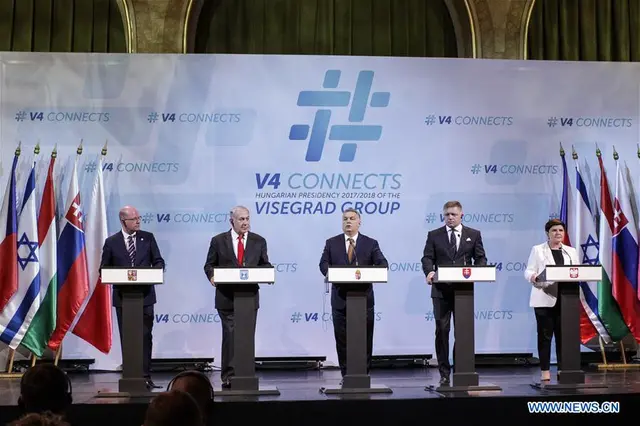Israeli Prime Minister Benjamin Netanyahu thanked the support of the
leaders of the Visegrad Four (Poland, Hungary, Czech Republic and
Slovakia) regarding the critics of the European Union (EU) against
Israel, in a joint press conference held here on Wednesday.
Netanyahu is on an official visit in Hungary, the first by an Israeli prime minister in 30 years.
"I expressed appreciation for the positions taken by the Visegrad
countries on several occasions for representing this position about
Israel to the countries of Europe, there is an anomaly, I don't like it,
we are often criticized by Europe, often more than any other place by
western Europe, often by more than any other place in the world," he
said.
The EU had critized the Israeli government for hindering the peace
process in the Middle East by building settlements in the Palestinian
territories.
Calling Israel "a bastion of European and Western values" in Middle
East, he called for a "reassessment" in Europe about the relationship
with Israel.
"We have much to offer in the realm of security, in technology, this
is not only good for us but also I believe good for you," he said.
The host of the meeting, Hungarian Prime Minister Viktor Orban
thanked Israel for its efforts in keeping Europe safe. "Once again we
reiterate our acknowledgement towards Israel for what it does for the
security of Europe, in the future we would propose that the cooperation
between the EU and Israel becomes better," he said.
"If Europe does not cooperate with Israel it is punishing itself
which is pointless, therefore we propose in the upcoming period that
Israel and EU cooperation should return to the realm of common sense,"
Orban concluded.
Besides the ties between Europe and Israel, the other leaders of the
Visegrad Four brought up subjects regarding the quality of foods within
the EU.
Prime Minister of Slovakia Robert Fico said he was mandated by the
Visegrad Four to start talks next Thursday with European Commission
President Jean-Claude Juncker about the quality of foods, arguing that
the citizens of the Visegrad Four feel themselves as "second grade
citizens" due to the lower quality of food they often get from Western
European producers. He hoped that the EU would adopt new regulations
that would remedy that situation.
His Czech colleague Bohuslav Sobotka backed him up: "We don't want
that the producers send the same product in different qualities in
different countries." He called for a solution that was not to interfere
with the functioning of the common market.
About Israel, Sobotka told that the talks between the Visegrad Four
and Israel concerning the fight against terrorism, the illegal migration
and Syria were very important, and the propositions of Israel to be
supported by the Visegrad Four.
He also said that potential cooperation between Israel and the
countries of Central and Eastern Europe were possible in the fields of
water management and cyber security.
Beata Szydlo, prime minister of Poland said that beside the question
of the quality of food, the subject of legal status of workers from the
Visegrad Four in western Europe was a key issue, where the Visegrad Four
would seek common representation as a group.
She also pushed for deeper cooperation with Israel in the fields of security, migration and fight against terrorism.
 简体中文
简体中文












